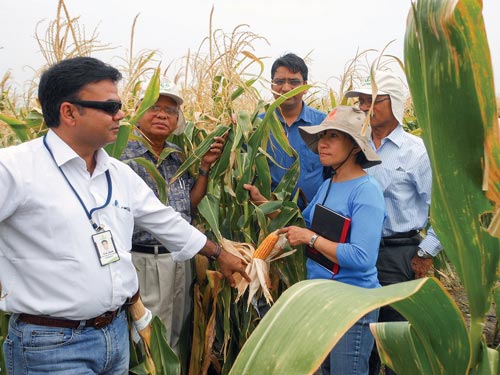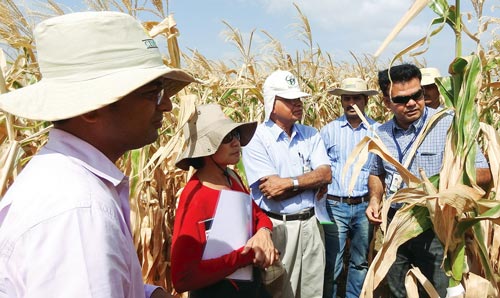Dr. Nora Lapitan, the new science advisor in the Bureau for Food Security of the U.S. Agency for International Development (USAID), and lead of USAID’s Climate-Resilient Cereals portfolio, visited the maize field trials being conducted in India as part of Heat Stress Tolerant Maize for Asia (HTMA) during 17-21 June.

Lapitan is the project manager and provides technical oversight. Supported by USAID under the Feed the Future (FTF) initiative, the HTMA project is led by CIMMYT-Hyderabad. HTMA is a public-private alliance that targets resource-poor people of South Asia prone to face weather extremes and climate-change effects. The project connects several public sector agricultural research institutions in South Asia such as the Bangladesh Agricultural Research Institute; Maize & Millets Research Institute, Pakistan; National Maize Research Program, Nepal; Bhutan National Maize Program; and two Indian state agriculture universities – Bihar Agricultural University, Sabor and University of Agricultural Sciences (UAS), Raichur, as well as Purdue University in the U.S. Additional participants include seed companies DuPont Pioneer, Vibha Agritech, Kaveri Seeds and Ajeet Seeds. This was Lapitan’s first trip to India, which she chose to start with HTMA maize field activity visits. She visited maize trials under managed heat stress at different sites in India, starting with the trials at the Borlaug Institute for South Asia (BISA), Ludhiana on 17 June.
A team of scientists from BISA, including Dr. H.S. Sidhu, Parvider Romana and Manish Koth showed her HTMA trials and explained the activities. The next day she visited the HTMA trials at DuPont Pioneer sites in Jalandhar, Punjab, where Dr. S.K. Kaushik explained project activities, including various types of hybrid trials, heat stress symptoms in the field and promising heattolerant hybrids. After visiting the maize trials in Punjab, Lapitan traveled to southern India, visiting HTMA trials in Hyderabad and Baijenki, Karimnagar. In Hyderabad, she visited the trials planted at a CIMMYT site within the International Crops Research Institute for the Semi-Arid Tropics (ICRISAT) campus, where Dr. P.H. Zaidi, CIMMYT senior maize physiologist and HTMA project leader, explained ongoing HTMA field trials across sites in South Asia in collaboration with partners. M.T. Vinayan, CIMMYT India maize stress specialist, discussed trials planted at the Hyderabad site.

The presentation was followed by a field tour, where Lapitan could see the performance of some of the most promising heat-tolerant maize hybrids. In the afternoon, Lapitan met with CIMMYT-Hyderabad staff, where Zaidi presented the office’s overall program and various ongoing projects. The next day, she and Zaidi visited HTMA trials at the Kaveri Seeds site at Baijenki, Telangana. Dr. N.P. Sarma, director of research; Dr. B.S. Dahiya, senior advisor; and Dr. Ramesh Chaurasia, maize breeder at Kaveri Seeds, explained the HTMA field trials at their site.
Lapitan took a field tour, where Chaurasia explained the details of the ongoing trials and showed her a number of promising heat-tolerant hybrids. “This is very exciting for our company; to see unique products like heat-tolerant hybrids identified within two years of the project start, which we are ready to take forward in largescale testing,” said Sarma. He further explained that there are very few options for such types of maize hybrids, and that this is a newly emerging market. It is certainly a unique option for resource-poor farmers to provide food during those hot and dry months and also feed for their livestock.
After completion of the field visits, Lapitan expressed her strong satisfaction with HTMA project activities, saying “it is exciting to see that partners are ready with first wave of products for deployment within two years. This is remarkable and I congratulate the HTMA team.”
 Climate adaptation and mitigation
Climate adaptation and mitigation 
